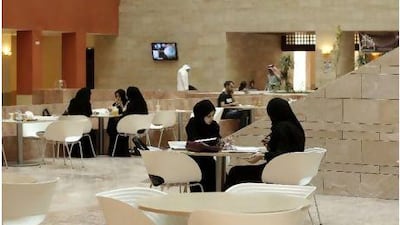KUWAIT CITY // Western-based universities in the GCC are at risk of failing because of difficulty recruiting students and a reliance on outside funding, an economist studying the impact of new institutions says.
John Willoughby, an economist at the American University in Washington, speaking at a conference held by the London School of Economics and Political Science's Kuwait Programme last week, said: "There are important institutional, political and social challenges facing the new higher education institutions of the GCC."
Mr Willoughby said some of the prestigious institutions that opened in the region are having difficulty recruiting quality students and rely on government subsidies, and "there are disturbing stories that suggest that many of the less prestigious institutions are under considerable financial stress".
"The educational environment is not stable, and it would be foolish to predict exactly how the college and university system will evolve," Mr Willoughby said.
As energy exports enriched the GCC, the region's governments educated their citizens in state-run universities or paid for them to attend higher educational establishments in the West. But as foreign institutions globalised towards the end of the century, they targeted the wealthy region as a prime destination for expansion.
The revolution "began slowly and hesitantly in the early 1990s" with the openings of the American University in Dubai and the University of Wollongong in Dubai, Mr Willoughby said. Soon after, Oman allowed the establishment of private higher education institutions, and Sharjah founded two universities in 1997.
Meanwhile, Qatar has been developing its ambitious Education City that includes six branches of US universities, including Carnegie Mellon and Georgetown. In 2002, the Gulf University of Science and Technology became the first private university to open in Kuwait and Abu Dhabi has since struck deals with Paris-Sorbonne and New York universities to open branches. Since 2003, Saudi Arabia has tripled the number of state universities to 24. Scores more colleges have tapped into a regional demand for higher education. Some, such as the American University of Kuwait are privately owned and intend to make a profit; others, such as the American University of Sharjah, are backed by members of the ruling family and try to cover their costs. Zayed University, which opened in 1998 to teach the UAE's women, is government-run.
Mr Willoughby believes the number of new institutions will force them to look overseas for students, and contribute to the "slow but steady decline" in national population. The competition has proved too much for some schools already. George Mason University in Ras al Khaimah closed in 2009, and Michigan State University in Dubai cancelled its undergraduate programmes the following year.
Despite the huge diversity of the new schools, their collective preference for teaching in English with Western-oriented coursework is changing the face of higher education in the region. Critics say the institutions are relegating Arabic to a second language and giving foreign academics an advantage over nationals. Other Western ideas, such as coeducation, do not sit well with the conservatives in the region.
"These criticisms imply that many of the higher-education experiments sweeping through the region are culturally insensitive and academically inappropriate," Mr Willoughby said.
Dr Shafeeq Ghabra, an instructor at Kuwait University, believes that rather than being insensitive, the new institutions' tendency to self-censor is affecting their standards. He said some universities do not use art books that depict the human body, a practice that is considered un-Islamic, and textbooks that include articles about controversial writers such as Salman Rushdie are quietly set to the side. He said the teaching of politics, religion, culture and history can all be affected by local sensitivities.
The institutions lack an emphasis on skills such as critical thinking, reading, and writing, and they do not encourage students to become lifelong learners, Mr Ghabra said. "We are at a crossroads, we need quality education. We still don't have it."
For others, the textbooks that used in classrooms do not have enough connection to local society. Tim Rogmans, an instructor at Zayed University said some classes use US textbooks that include whole chapters about US legislation: "You can say, 'skip these chapters', but they should really be replaced by good materials that relate to the local context."
Mr Rogmans said the new universities have brought GCC nationals the opportunity to get a quality education at home and "that's major progress".
jcalderwood@thenational.ae

